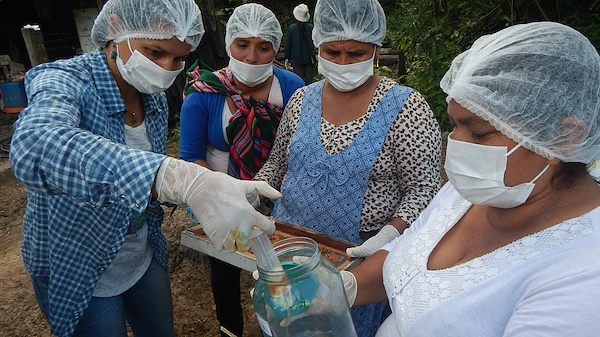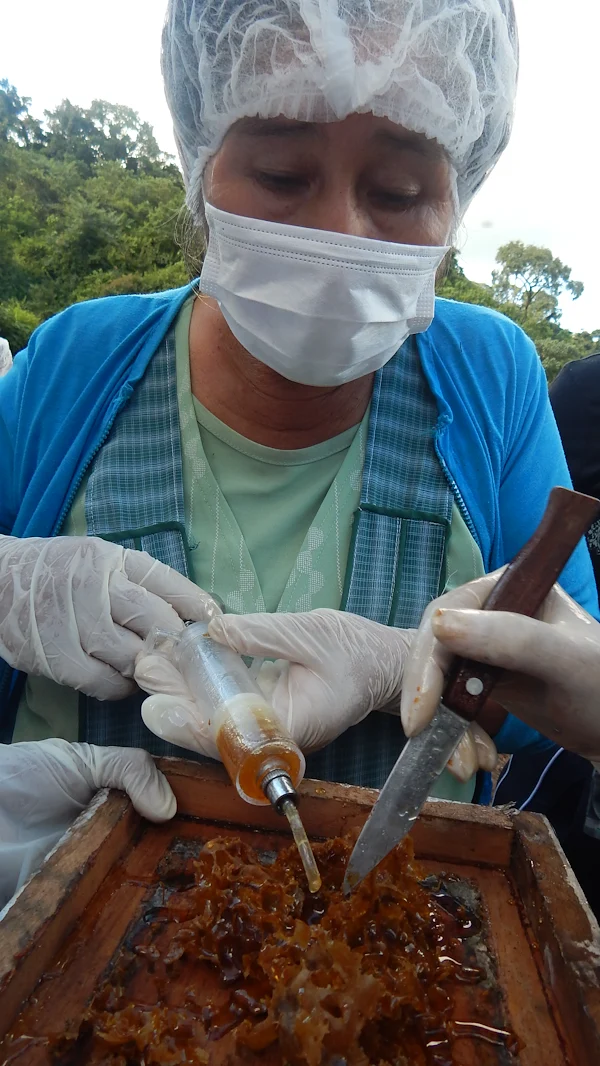
FAO Feature Story
Success as sweet as honey
Women’s organizations in the El Chaco province of Bolivia find success harvesting honey from stingless bees
22/05/2020
In the mountains of Bolivia's Serranía del Iñao National Park, at the foot of the Eastern Cordillera, María Méndez carefully harvests honey from stingless bees. She works alongside women beekeepers of all ages in Monteagudo and Villa Vaca Guzman in the Chaco Province. Maria uses a syringe to delicately extract the honey, known for its distinct sweet and sour flavor and dark amber color. The women are solely responsible for the careful maintenance of these special, fragile bees. The producers collect enough honey for their families and sell the rest to make extra money that they use as they see fit.
Maria and the women follow the practices of their ancestors; meliponiculture, the keeping of these native stingless bees, has been practiced for centuries. The local Indigenous community, the Guaraní people, raise Tetragonisca angustula, a type of stingless bee species. Locals call it various names, like honey bee, donkey, tancarillo or negro.
The extraordinary honey is harvested primarily for its prized medicinal value. Since ancient times, the honey has been an essential medicine for the Guaraní people. The bees feed on native plants, whose flowers, rich in alkaloids and flavonoids, give the honey vitamins, minerals, and anti-bacterial and cicatrizing properties. Maria says she feeds it to her children to strengthen their immune systems against illness.
However, melipona honey has become a rare good. Deforestation and the introduction of the more productive European honeybee has led to the dwindling of the 350 known stingless bee species. Perfectly adapted to the local environment, these stingless bees are crucial pollinators. Their loss would lead to a decrease in biodiversity in Bolivian forests.
These women harvesting the honey are working to reinvigorate respect for local stingless bees and their unique honey. While they follow their ancestors' traditions, they use modern innovations to scale-up their productions. In the past, empty pumpkins were used for the beehives; now, the women use wooden boxes that improve handling and the bees' comfortability.
In 2018, the Mountain Partnership Secretariat and Slow Food met the melipona producers and began a partnership to improve the value chain of the honey product. Later that year, the melipona honey was granted the Mountain Partnership Products (MPP) initiative label.
The MPP label is a narrative label that tells the story of each mountain product, enabling consumers to make informed purchases by learning about products' origins and cultivation, processing and preservation methods, nutritional value and role in local cultures. The honey producers found that adding the MPP label to their honey made it more attractive to consumers, who became more aware of the honey's medicinal value and of the women's organization who produced it.
The honey is sold in drugstores in Bolivia, such as common drugstore chain Bioleón and in markets called ECOTERRA. The producers were able to increase their sales price by more than 80 percent. One liter of melipona honey, which once sold for USD 22, is now sold for USD 40.
Maria, one of the leading producers, is expanding the operation through local workshops and trainings. She is a facilitator in meliponicultura and beekeeping in a local field-school.
She and the other beekeepers feel proud to have a label on their honey that honours the place it calls home and the people who made it available to those living near and far. They are happy to know that their product and their story is spreading beyond the confines of their community.
2024 Updates
With the support of a grant from the Mountain Facility , melipona honey beekeepers have united to enhance the production and marketing of their native bee products leading to significant value added throughout the production process.
Women beekeepers joined forces to create the Asociación de Mujeres Meliponicultoras Ecológicas del Chaco (AMMECH) and are currently taking steps to formalize its status with the Government of Chuquisaca. A board of directors was elected, composed by 40 leading women representing 315 producers from 45 communities in Villa Vaca Guzmán and Monteagudo. The formalization of AMMECH has empowered women beekeepers with stronger decision-making power and more opportunities for business growth.
With the support of the Mountain Partnership Secretariat and Fundación Participación y Sostenibilidad (PASOS), AMMECH members have taken part in training sessions leading to higher production and diversification of products that has also strengthened their business and financial management practices and skills. Additionally, two training sessions conducted with 40 producers focused on strategies for adding value to products.
A collection and processing center has been established and furnished with equipment, such as steel tables, thermometers and precision electronic scales, to improve product quality and consistency.
Participation in various fairs has increased product exposure and generated customer interest, especially in new products such as soaps, lipsticks and candies.
This year, AMMECH members will be visited by experts of the Unidad de Coordinación del Consejo Nacional de Producción Ecológica (UC-CNAPE) and will be certified as organic through the mountain Participatory Guarantee System (PGS), a specific innovative PGS designed for mountain beekeeping traditional practices through an interactive, community-based approach. It will allow to obtain the official national organic sign of guarantee for their production systems.

defdadce-3662-4cd2-ac14-687fc6071544.jpg?sfvrsn=4c22757d_1)

c1fbd760-f553-41a0-88d9-9236ae0b748d.jpg?sfvrsn=c9761d55_1)